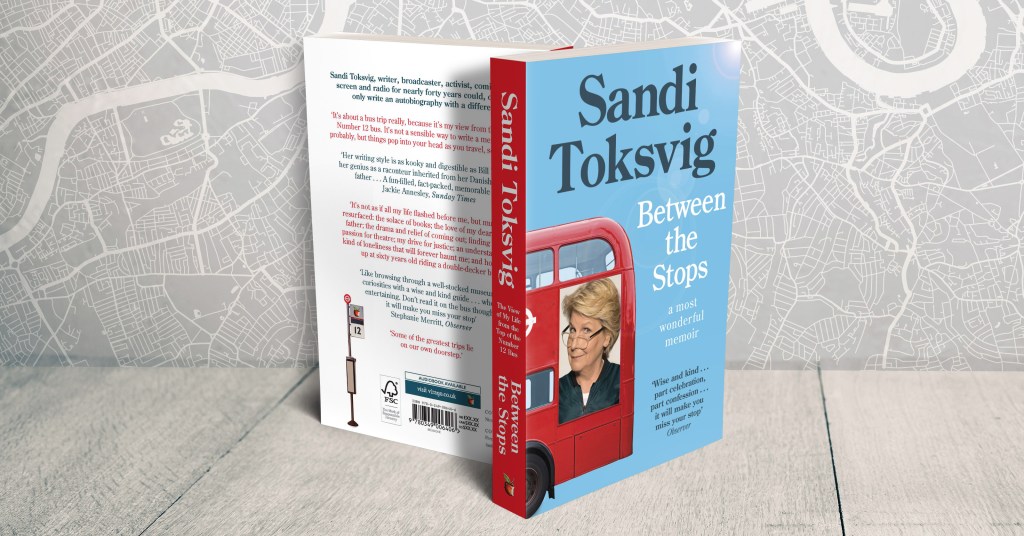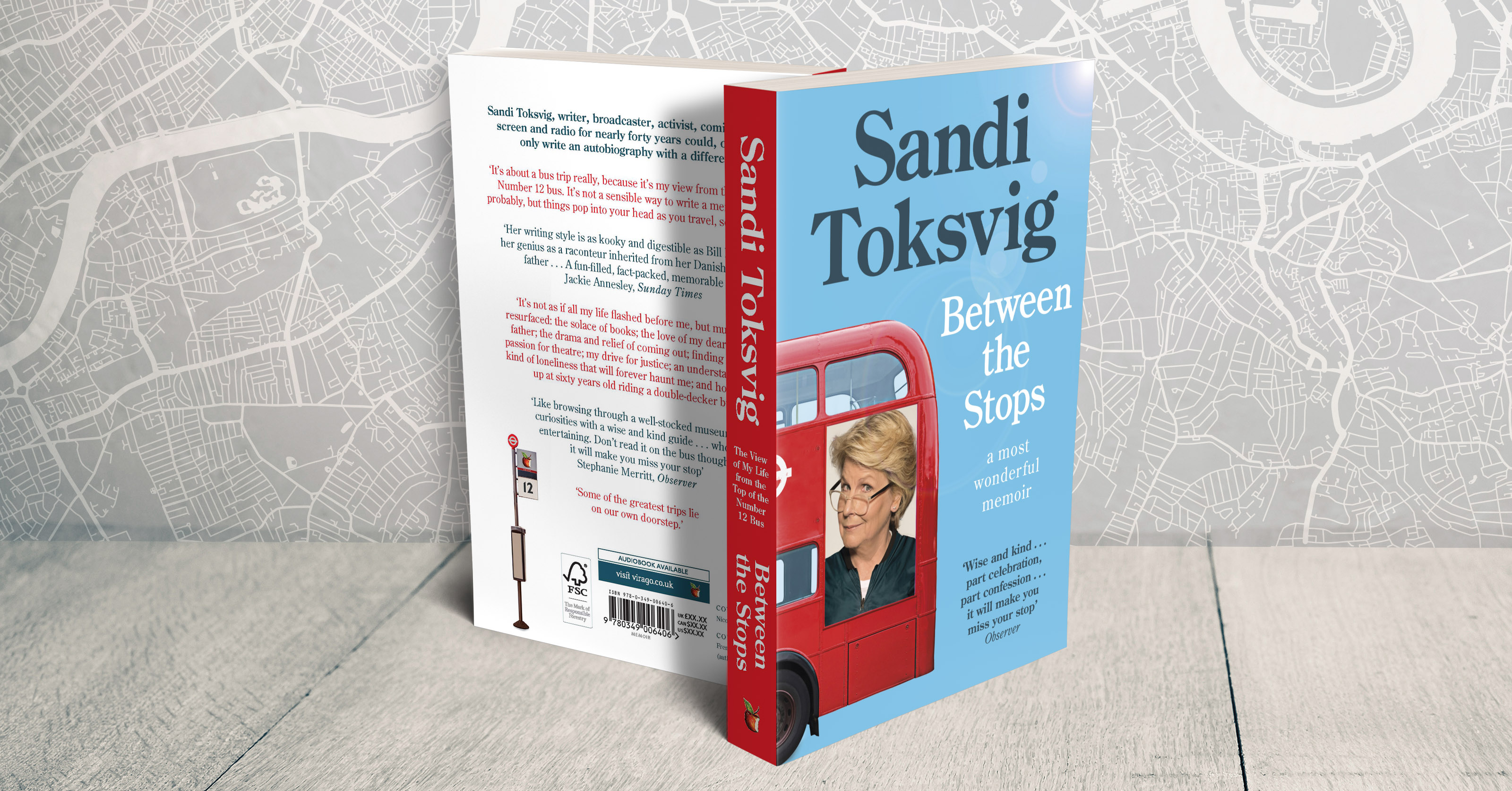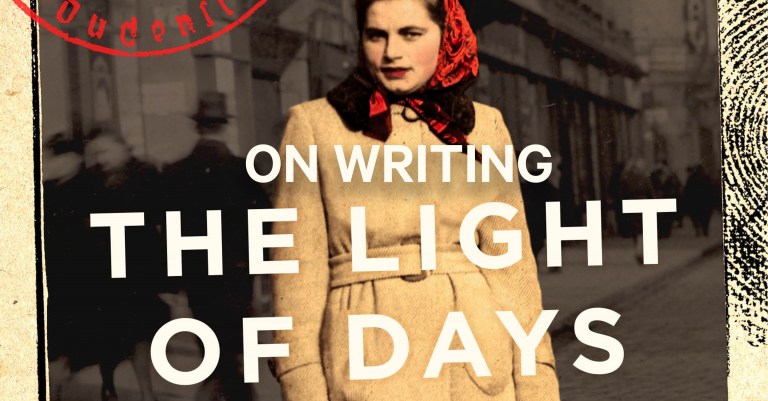Board the No. 12 Bus with Sandi Toksvig

Read an extract from Sandi Toksvig’s memoir, Between the Stops: The View of My Life from the Top of the Number 12 Bus
Preface
When I was about seven my father gave me my first watch. It was small, with a thin blue leather strap.
‘You wear it on your left wrist,’ he explained.
‘Why?’ I asked.
‘Because you are right-handed. All right-handed people wear their watches on their left wrist.’
I took the watch and solemnly strapped it to the ‘wrong’ wrist, where I have been wearing it ever since. It was a tiny act of defiance, of standing apart. I don’t know whether it’s a curse or a blessing never to follow the crowd. It is a trait that has dogged me all my life. I’m not saying it’s a good thing. It’s just part of me. So, this is a memoir, but it isn’t like the ones most people write. On the whole, when people look back at their lives, they begin with a sort of clearing of the throat before declaring ‘I was born in …’ I don’t think I have it in me to write like that. This is about some parts of my life, but it is also about travelling through London on the Number 12 bus, a red double-decker that meanders for just over seven and a half miles from Dulwich Library in south-east London to the BBC’s Broadcasting House in the centre of town. I started taking the bus because it happened to stop outside Dulwich Library, which was near where I was living, and happened to head where I needed to go.
I love London with a passion. The sight of a double-decker still gladdens my heart; you just know you are in London. A single shot of such a bus in a film sets the action firmly in the UK capital. I have spent a wonderful time catching the Number 12. As I travelled, I have realised a few things – that hardly anyone looks out of the window, and that every one of the stops along the way sparks some thought and is worth exploring. I am history mad and here is one of the greatest cities in the world laid out before me at almost no cost. Sometimes I took the bus even though I had nowhere I was supposed to be. I stopped looking at my phone and started getting off to have a look at unexpected places.
I am over sixty now and travel for free, so I have made great use of my bus pass. Sixty used to be the age some women retired but I have never worked harder. I never thought I’d get to such an age. My father died aged fifty-nine and for some reason I never thought I would outlive his years. It has made me reflective about my life. No bus in London is quick, so I have had time to think – a rare thing these days. Things pop into your head as you travel. I suppose none of us remember the past in order. It’s all a jumble of recollections.
I have resisted writing a ‘memoir’ because I didn’t want to create some kind of printed version of the ‘selfie’, where people don’t look like themselves at all. I wanted to look out as much as in, so this is also a sort of love letter to the fact that some of the most fascinating travel is available from the nearest bus stop.
I have been in radio, television and on stage for forty years now. Twice in my life I have endured agonising periods of people shunning me, not talking to me. Now when I am out and about I am sometimes recognised and strangers want to talk to me. It’s often wonderful though sometimes unsettling, but on a bus, no one talks to those they don’t know. On the Number 12 I am blissfully ignored. It is peaceful. A haven in the midst of bustle, and I need that.
Geek that I am, libraries are my happiest places; in a library everyone is intent on their own discoveries and I soon realised that buses have a similar solitary quality. People on buses don’t look at each other. The seats all face forward, and if there is room no one sits next to anyone else. I am also that ageing woman on the bus who no one gives a second glance to and I don’t mind a bit. Those who have seen me perform may think it bizarre but there is a vast disconnect between the public show-off and the shy book-reader. Unobserved, I am able to see things differently and looking out on the city, really looking, really seeing, has been a revelation. It’s made me think about my life, but it’s also made me think about seeking what is forgotten or even hidden in plain sight, just like me on my journey.
I am the middle child of three; the daughter of a Danish journalist and an English mother who was one of the first women to become a studio manager at the BBC. I was born in Denmark, grew up in various African countries so long ago that most of them have changed their names, then America, and finally to boarding school in Britain before settling to live in south-east London. It was a rootless childhood, but from it I learned that everywhere in the world has something to commend it if we just take the time to look.
I loved what I saw from the top deck of the bus (preferably the right-hand seat at the front). It taught me to look again at the familiar and find new pleasures. This is not a journey that begins by heading out into the wild blue but instead starts with a walk under a grey sky to a bus stop. The chapters consist of thoughts that occurred to me as I travelled and about places that appealed to me as I stared out the window. It’s not as if all my life flashed before me; but much has resurfaced: the solace of books, the love of my dear departed father; the drama and relief of coming out; finding love; my passion for theatre; my drive for justice; an understanding of a kind of loneliness that will forever haunt me; and how I ended up at sixty years old riding a double-decker bus.
If none of these things appeal to you may I gently suggest that you change seats now. Life is too short to read a book that upsets you. On the other hand, if you’re ready, let’s get going.
For more from Sandi, grab yourself a copy of Between the Stops and listen to her episode of the Virago podcast!
A funny and moving trip through memories, musings and the many delights on the Number 12 route, Between the Stops is also an inspiration to us all to get off our phones, look up and to talk to each other because as Sandi says: 'some of the greatest trips lie on our own doorstep'.









